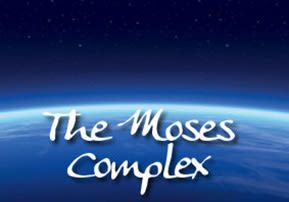
The Moses Complex
“In my reflections on the Christian Church years after leaving the fold, I continue to be amazed at the amount of clear evidence against the validity of what they preach.”

Strangers No More, Part 9
“How generally accepted the Seven Noahide laws are can be seen in the Joint Resolution by the Senate and the House of Representatives of the USA resolved on March 26, 1991. The statement designates a special Education Day whereby Congress recognizes the historical tradition of the ethical values and principles that have been the bedrock of society from the dawn of civilization, when they were known as the Seven Noahide Laws.” (Law and the Noahides, Prof. Nahum Rakover, p. 125.)
These rules are general guidelines given by God to all mankind before the time of any institutional religions. Later, during history, the same God gave more specific laws in the Holy Torah to the Jewish people. For a non-Jew, these seven laws are binding. Throughout the world we already see a growing number of people from Christian Churches leaving their denominations to form Noahide congregations. I believe this will be a fast growing movement in the future. We see people leaving their false religions and returning to the basic truth of the Tanach as expressed in these seven laws. The Church as a political institution will be dismantled together with its theological structure and replaced with communities of people who believe in One God. Fellowships of believers will turn away from prayer to various gods, concentrating their renewed spiritual communication to God – the Only One.
God gave the Holy Torah to Moses and subsequently to all the Jews. This happened at a certain place and time in history, and was witnessed by all of Am Yisrael. When was the New Testament given? And to whom was it directed? The authors of the New Testament blatantly place themselves above the Torah in their writings, ignoring the warning in the Torah that says: “You shall not add to the word that I command you, nor shall you subtract from it, to observe the commandments of Hashem, your God, that I command you” (Deuteronomy 4: 1–2). So how did the authors of the New Testament handle this issue? They ignored the existing warning and added one of their own to the end of the last book in the New Testament. In the Book of Revelation the apostle John says: “I warn everyone who hears the words of prophecy of this book: if anyone adds anything to them, God will add to him the plagues described in this book. And if anyone takes words away from this book of prophecy, God will take away from his share in the tree of life and in the holy city, which are described in this book.”
The Church has transformed the words of man into the words of God by proclaiming the New Testament to be a Holy Book. The original God-given Torah has been replaced by a sample of letters written by man. The New Testament, written by man, annuls the Torah given by God, although it preserves some of its teachings, believing them to be useful. Speaking of the Torah, the Book of Hebrews in the Christian New Testament says: “ The old rule, then, is set aside, because it was weak and useless. For the Law of Moses could not make anything perfect. And now a better hope has been provided through which we come near to God” (Book of Hebrews 7:18–19).
These are serious accusations leveled against Judaism by the Christian Holy Book. For this reason, the underlying feeling of Christians towards Jews is one of superiority, because, as stated in their New Testament, they have something better than the “old law” which is “weak and useless and will disappear” (Book of Hebrews). At the same time, this attitude is tainted with jealousy because the Jews have Abraham, Moses, David, and all the rest. The Christians believe that one day the Jews will accept Jesus, and great blessings will await them. Undoubtedly there are also groups of Christians who sincerely support and bless Israel out of the pure faith that their God is the God of Israel.
In my reflections on the Christian Church and its beliefs, years after leaving the fold, I continue to be amazed at the amount of clear evidence against the validity of the main issues in Christianity, some of which I have commented on above.
There is one analogy I would like to make, which sums up the complexity and gravity of both the accusations and the case.
Let’s call it the “Moses-complex,” dating back to the time of the Exodus when the Israelite nation prepared itself to receive the Torah. Moses, as the prophetic leader of the Nation, would talk to God on behalf of the people, and at the same time, talk to the people on behalf of God. The nation learned to live with a mediator, a physical being, who represented them before God, and who also represented God to them. When they were to receive the Torah, Moses went up the mountain for forty days. This was a long time for them to wait. The people became impatient. They believed Moses had died and they desperately needed something to worship. God was too holy and too distant to approach directly. Remembering the statue gods in Egypt, they decided to make a god for themselves, and convinced Aaron to make a golden calf.
We all know the result. The sounds of the festival, of people celebrating and dancing around the man-made god, rose up the mountain. Moses was on his way down. He was furious. How could he intervene this time? God punished the people who had turned to idol worship. The message was clear: worship no idol! But they still had Moses. He continued to teach and guide them and pray for them until his time was complete and Joshua took over. After entering the Promised Land the nation still had leaders and prophets with authority. The Judges, the Kings and Prophets – they all served the purpose of summoning the soul of the nation. After Malachi, the last of the prophets, who lived about 400 years Before Common Era (BCE), we no longer had prophesy. The nation’s longing for the Mashiach grew stronger; they desperately needed a savior to redeem them from the oppressive powers, the Greeks and the Romans in turn. By the end of the Second Temple period, the people had seen nothing close to the authority or spiritual leadership of Moses for centuries.
It was against this background and atmosphere that Jesus came along. He did not turn out to be the Mashiach they had long been waiting for, but his followers made him a mediator between man and God. The apostles started to teach that you can approach God only through this man from Nazareth. After his death his followers declared that since he did not fulfill the expectations of Mashiach during his lifetime, he will come again and complete the job at a later date. Soon the main focus of these events shifted from the Jewish people to the gentiles. During coming decades and centuries, Jesus’ status changed from that of a mediator to one of a god to be worshiped, the exclusive savior without whom one is doomed to hell. A few centuries into the Common Era, the Church, which by then was dominated by non-Jews, established a decree stating that Jesus was god and had to be worshiped equally to the Father in heaven. The symbol for this god is the crucifix – to be found in every church. Christians bow before the crucifix to show respect – some even kiss it. Whenever Christians pray, the prayer must be in the name of Jesus.
I call this phenomenon the “Moses-complex.” What happened during a forty-day period in the desert can be seen here as a development over a few centuries. A people who longed for Moses ended up with a golden calf. The second time around, the people longed for a Savior and ended up with a god called Jesus.
Jesus became to the Christian world what the golden calf was to the Israelites during Moses’ absence. This god was convenient. He was always there, visible, and tangible. He was approachable. He was not demanding; on the contrary, he always forgave and understood. His followers became dependent on him because the only way to survive and to be purged of sin was through his intervention. Therefore it became difficult to let go of this man-made god.
There is a similarity between the golden calf cult and the worshiping of Jesus in Christianity. The “Moses-complex” created this phenomenon and gave the gentile world a substitute for the God they never knew.
To be continued.
(Strangers No More, by Shlomo Brunell. Reprinted with courtesy of Gefen Publishing House 2005 www.gefenpublishing.com)












Tell us what you think!
Thank you for your comment!
It will be published after approval by the Editor.